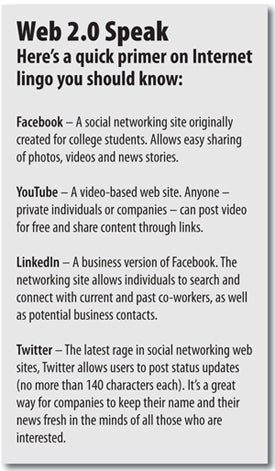A Brave New World For Business | A new breed of entrepreneurs is digging for gold on the Internet
Almost a decade since the dot-com bubble burst in 2000, a new wave of Internet-savvy entrepreneurs has emerged, poised and ready to conquer the online market with innovative business ventures. The good news is, this cadre of online business owners has learned from the past.
“The goal for all of the startups back then (during the dot-com boom) was to do just the opposite of what people are trying to do today,” said George Gendron, director of the Innovation and Entrepreneurship Program at Clark University and former editor-in-chief of Inc. Magazine. “Really smart people did some really stupid stuff, and I don’t see that happening now.”
New Culture
The “get large or get lost,” mantra of the late 1990s, fueled by easily accessible venture capital, seduced some entrepreneurs into believing that they could instantly establish a mature business.
In contrast, the focus today is on starting small and local. Young entrepreneurs in Central Massachusetts are investing their own money into their businesses and looking to carve out a niche market that may eventually lead to greater prosperity and more opportunities.
One example of this new breed could be Joe Penna of Leominster, a 22-year-old who dropped out of the University of Massachusetts Medical School in Worcester two years ago when he realized that life of a surgeon would not offer him the satisfaction of artistic creation.
He turned to cinematography and began working on music videos and commercials in and around Boston. Even while in medical school, Penna would often devote his free time to producing quirky YouTube videos, and once his traditional cinematography opportunities began to dry up due to the recession, Penna turned to online video site as a new, full-time source of income.
Penna’s videos attempt to tap into the viral zeitgeist and are far from serious. Many are humorous or odd, or both. One is a two-and-a-half minute musical homage to parking meters while another — his most popular — is a unique take on Mozart’s “Marriage of Figaro” featuring Penna playing the guitar. Most of the videos on his channel (available at www.youtube.com/mysteryguitarman) have received between 150,000 to 200,000 views, while his most popular has exceeded 3 million.
“You have to constantly market yourself and be looking for new opportunities,” he said. “You invest a lot of time and some money into your video and you hope that it does well. It’s like playing the stock market or gambling.”
Of course, the drawback of many Internet ventures, particularly free content sites like YouTube, is how to make money while doing what you love. Well, Penna is one of YouTube’s “content partners,” which allows video creators to earn a small percentage of advertising dollars for every view their videos get and every time a viewer clicks on one of the banner advertisements that run on the video’s page.
To be eligible to be a content partner, a video maker must have at least 1,000 subscribers on their YouTube channel.
And even then, the subscribers aren’t always enough. Penna says the real challenge is keeping people interested in and excited about the videos that he produces.
Bound by a non-disclosure agreement, Penna could not comment specifically about what he makes, but he did say that he is earning as much and sometimes more working for YouTube as he did as a traditional cinematographer, which amounted to about $3,000 per month.
Even so, he admits to leaving with a good deal of uncertainty.
“The Internet is rapidly and constantly changing, but if you evolve with the site, if you keep your viewers watching your videos and keep them coming back, you’ll be okay,” he said.
“I’d be doing this anyway because I love doing it,” he added. “It’s my full-time job, but I’m keeping my options open.”
A Whole Lotta Love
Feature film producer Andrea Ajemian already has other options.
The Rutland native produces WorcesterLove.com, a web site dedicated to free, online travel videos of interesting destinations and activities in Central Massachusetts. Ajemian and partner Kaz Gamble of Worcester are in post-production of their latest feature film, but once it’s wrapped up, WorcesterLove.com may become their primary focus.
“We haven’t actively gone out there and made that our full-time job,” she said. “But I’m confident that if we do, we’d be very successful at it.”
The first season of WorcesterLove launched in 2007, and since then its videos have received a total of 200,000 views. But the project took a backseat once Ajemian and Gamble immersed themselves in their latest film. The duo is currently filming and editing episodes for the web site’s second season, which they plan to launch in August.
Sponsorships have been sold, but Ajemian has yet to pursue the sale of banner advertisements, which she says will be the primary source of income for the business. She may also begin courting potential investors, which intimidates her less than most other entrepreneurs.
Unlike feature films, which often take years to produce and require investors to wait just as long to see any type of return on their investment, Ajemian says Internet businesses offer investors a much quicker return. She’s also confident that her project will spark considerable interest.
“We did a lot of research before staring the show,” she said. “We know that the revenue for online videos is going to skyrocket in the next few years.”
A Major Investment
Mike Langford is equally committed to his online venture, Tweetworks; arguably more so, since the 37-year-old has invested about $50,000 of his own money into the venture. The social networking site works as an application to Twitter.com, allowing users of the micro-blogging site the ability to form groups focused around specific topics.
“I discovered it was very difficult to follow a conversation [on Twitter] and difficult to find the people that were talking about the things that I was interested in,” Langford said.
The site launched near the end of last year and has yet to evolve into a source of income, but Langford believes that eventual professional accounts, which will offer customizable tools that Twitter can’t, will bring in the money.
He is just now looking for investors and purposely chose to delay that phase, believing that an operational model in-hand would make the process easier.
He also understood that seeking out investors with only an idea would force him to relinquish considerable control and/or ownership of the business.
Tweetworks is close to becoming his full-time focus, though Langford does own Course Pilot Financial, a Westborough-based investment advisory firm. Langford took the chance and created Tweetworks as an investment for himself.
“As an investor, putting some chips on the table in this space is probably a good idea,” he said. “Social networking is never going to be this young again."











0 Comments